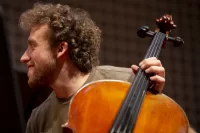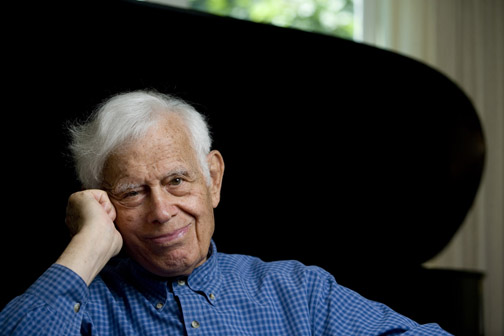
Artist-in-residence Glazer to perform broad offering of piano music
Bates College artist-in-residence Frank Glazer offers an evening of piano music spanning the centuries from Haydn to Hovhaness starting at 7:30 p.m. Friday, May 11, in the Olin Concert Hall, 75 Russell St.
The concert is open to the public at no cost, but tickets are required. For tickets and more information, please contact 207-786-6135 or olinarts@bates.edu.
Recently featured on American Public Media’s popular program “The Story,” the 97-year-old Glazer, of Topsham, has had a distinguished international career that includes numerous recordings, solo recitals and performances with orchestras and chamber ensembles. With his wife, the late Ruth Glazer, he founded the Saco River Music Festival, held for many years in Cornish, Maine. Glazer has been an artist in residence at Bates since 1980.
Here’s his May 11 program:
Haydn’s Sonata in E minor, Hob. XVI/34 is one of seven sonatas (out of some five dozen in all) that the composer set in a minor key. In its key modulations and dramatic transition from second to third movements, this piece from the composer’s “Sturm und Drang” period anticipates Beethoven.
Beethoven provides two works on Glazer’s program: the “Phantasie,” Op. 77, and the Sonata in E major, Op. 109. The former captures Beethoven’s adventurousness, seamlessly passing through eight keys, three meter changes and an array of tempos.
The latter, one of Beethoven’s last sonatas, is less dramatic and more lyrical, more intimate, than its predecessors, and concludes with an intricately constructed theme-and-variations set.
“Jhala,” by 20th-century American composer Alan Hovhaness, incorporates Indian and Southeast Asian elements into a more traditional sonata form. The title refers to an Indian musical technique that alternates between melody and drone to build to a climax.
Busoni’s “Turandot’s Frauengemach” is the most popular of a series of six elegies that marked the achievement of the composer’s mature, and impressionistic, style. Based on the folk tune “Greensleeves,” the music is adapted from an orchestral suite that Busoni based on the play “Turandot.”
“Hulan” comes from a collection of Czech dances by Bedřich Smetana, a founding father of Czech music. This popular piece depicts a woman pining for her soldier lover.
The second of Franz Schubert’s sonatas to be published, the Sonata in D major, Op. 53, D. 850, is markedly quicker than its companion works and presents considerable challenges to the pianist.





